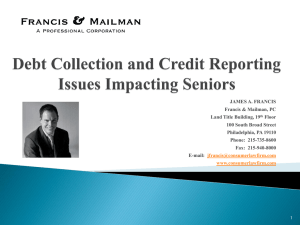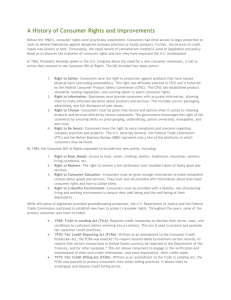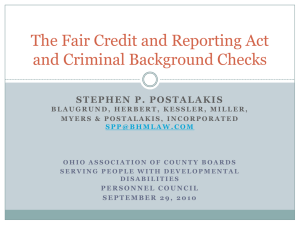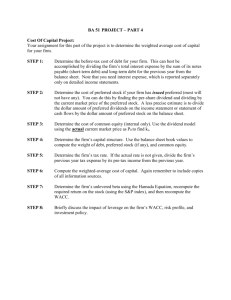Credit Reports FCRA and FDCPA - National Consumer Law Center
advertisement
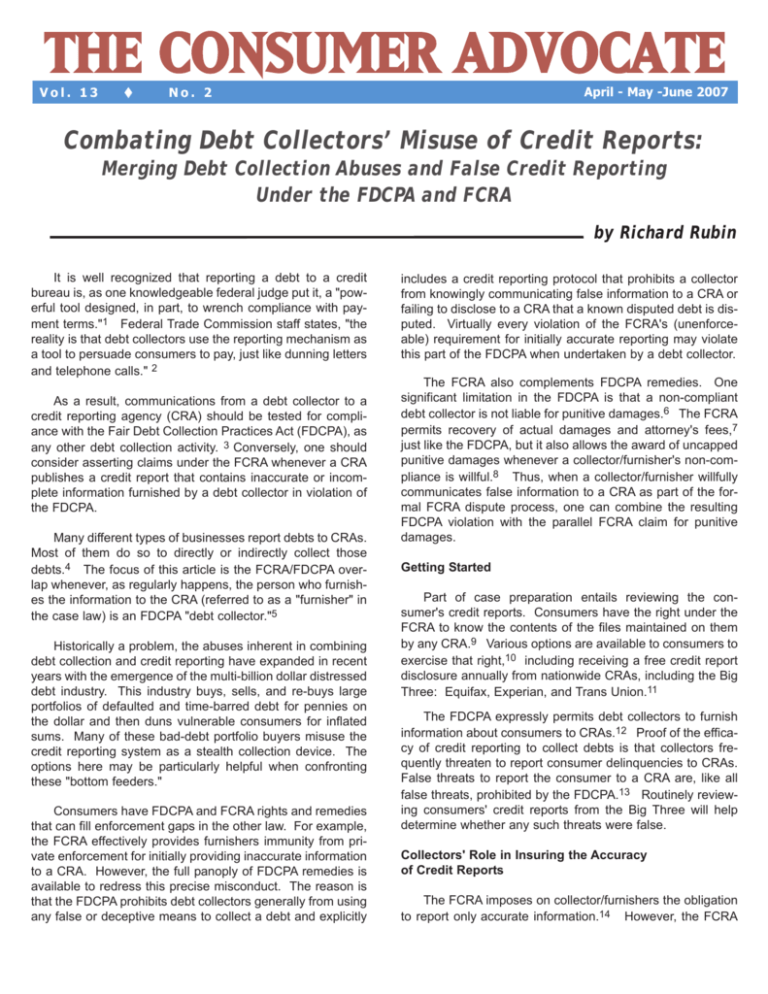
THE CONSUMER ADVOCATE Vol. 13 t April - May -June 2007 No. 2 Combating Debt Collectors’ Misuse of Credit Reports: Merging Debt Collection Abuses and False Credit Reporting Under the FDCPA and FCRA by Richard Rubin It is well recognized that reporting a debt to a credit bureau is, as one knowledgeable federal judge put it, a "powerful tool designed, in part, to wrench compliance with payment terms."1 Federal Trade Commission staff states, "the reality is that debt collectors use the reporting mechanism as a tool to persuade consumers to pay, just like dunning letters and telephone calls." 2 As a result, communications from a debt collector to a credit reporting agency (CRA) should be tested for compliance with the Fair Debt Collection Practices Act (FDCPA), as any other debt collection activity. 3 Conversely, one should consider asserting claims under the FCRA whenever a CRA publishes a credit report that contains inaccurate or incomplete information furnished by a debt collector in violation of the FDCPA. Many different types of businesses report debts to CRAs. Most of them do so to directly or indirectly collect those debts.4 The focus of this article is the FCRA/FDCPA overlap whenever, as regularly happens, the person who furnishes the information to the CRA (referred to as a "furnisher" in the case law) is an FDCPA "debt collector."5 Historically a problem, the abuses inherent in combining debt collection and credit reporting have expanded in recent years with the emergence of the multi-billion dollar distressed debt industry. This industry buys, sells, and re-buys large portfolios of defaulted and time-barred debt for pennies on the dollar and then duns vulnerable consumers for inflated sums. Many of these bad-debt portfolio buyers misuse the credit reporting system as a stealth collection device. The options here may be particularly helpful when confronting these "bottom feeders." Consumers have FDCPA and FCRA rights and remedies that can fill enforcement gaps in the other law. For example, the FCRA effectively provides furnishers immunity from private enforcement for initially providing inaccurate information to a CRA. However, the full panoply of FDCPA remedies is available to redress this precise misconduct. The reason is that the FDCPA prohibits debt collectors generally from using any false or deceptive means to collect a debt and explicitly includes a credit reporting protocol that prohibits a collector from knowingly communicating false information to a CRA or failing to disclose to a CRA that a known disputed debt is disputed. Virtually every violation of the FCRA's (unenforceable) requirement for initially accurate reporting may violate this part of the FDCPA when undertaken by a debt collector. The FCRA also complements FDCPA remedies. One significant limitation in the FDCPA is that a non-compliant debt collector is not liable for punitive damages.6 The FCRA permits recovery of actual damages and attorney's fees,7 just like the FDCPA, but it also allows the award of uncapped punitive damages whenever a collector/furnisher's non-compliance is willful.8 Thus, when a collector/furnisher willfully communicates false information to a CRA as part of the formal FCRA dispute process, one can combine the resulting FDCPA violation with the parallel FCRA claim for punitive damages. Getting Started Part of case preparation entails reviewing the consumer's credit reports. Consumers have the right under the FCRA to know the contents of the files maintained on them by any CRA.9 Various options are available to consumers to exercise that right,10 including receiving a free credit report disclosure annually from nationwide CRAs, including the Big Three: Equifax, Experian, and Trans Union.11 The FDCPA expressly permits debt collectors to furnish information about consumers to CRAs.12 Proof of the efficacy of credit reporting to collect debts is that collectors frequently threaten to report consumer delinquencies to CRAs. False threats to report the consumer to a CRA are, like all false threats, prohibited by the FDCPA.13 Routinely reviewing consumers' credit reports from the Big Three will help determine whether any such threats were false. Collectors' Role in Insuring the Accuracy of Credit Reports The FCRA imposes on collector/furnishers the obligation to report only accurate information.14 However, the FCRA 2 THE CONSUMER ADVOCATE prohibits consumers from enforcing this portion of the FCRA. Only designated public officials can do so.15 The FCRA's primary mechanism to ensure the accuracy of credit reports is the formal reinvestigation process that must be initiated by consumers with the CRAs. This mechanism is privately enforceable against furnishers. Furnishers must investigate the information that they have previously reported if a consumer disputes the accuracy or completeness of that information with the CRA.16 In effect (and in contrast to the FDCPA), the FCRA allows a collector/furnisher to misrepresent information one time and even more until the consumer disputes the credit report entry with a CRA.17 However, a collector/furnisher who fails to fulfill its obligations in the reinvestigation process becomes liable to the consumer under the FCRA for actual damages and attorney fees for a negligent violation, plus additional statutory and punitive damages when the violation is willful.18 The FDCPA contains both general and specific provisions prohibiting debt collectors from engaging in any form of misrepresentation or deception. In addition to outlawing objective inaccuracies, the FDCPA prohibits deception generally. The test is the "least sophisticated consumer" standard. Any communication that "can be reasonably read to have two or more different meanings, one of which is inaccurate," is deemed deceptive.19 The FDCPA also contains a specific provision applicable to debt collectors when they communicate with a CRA. This provision, § 1692e(8),20 provides a very effective means for consumers to police debt collector credit reporting. Under § 1692e(8), a debt collector is liable for reporting to a CRA information that it knows or should know is false21 or for failing to disclose in any communication with a CRA that it knows a debt is disputed.22 The CRA naturally is aware that the consumer is disputing a debt, because of its own direct dealings with consumer through the formal FCRA dispute process. That knowledge does not relieve the collector from this FDCPA obligation to disclose that the debt is disputed, when communicating with that CRA.23 Recurring Examples Of False Credit Reporting Two categories of inaccuracies are particularly common. First, collectors often report an incorrect credit history or inaccurate current status of the debt. One example is misidentifying the legal obligor to force individuals (e.g. spouses or authorized credit card users) to pay debts that they do not legally owe.24 Another common abuse occurs when collectors ignore the special rules designed to make certain that debts are tracked and identified as a single obligation as they are transferred from holder to holder.25 Second, debt collectors often engage in the abusive tactic of "re-aging" a debt by failing to report the initial date of April/May/June/2007 delinquency or charge-off of the debt, as expressly required by the FCRA.26 As a result of this omission, the CRA is left with the false belief that the initial date of delinquency or charge-off is the more recent "date of last activity" (when the account was assigned to the collector) rather than a date months or years earlier, when the debt was in the hands of the original creditor. Misreporting in this manner means that the debt will be included in credit reports long after it has become legally obsolete and therefore no longer reportable (seven years after delinquency for most debts).27 A re-aged debt may also skew consumers' credit scores, since most credit scoring systems assign a higher negative weight the more recent the adverse item of information.28 This "re-aging" problem has grown particularly prevalent and profitable with the emergence of bad-debt portfolio buyer industry. This purposeful misrepresentation of the date of charge-off resurrects long dormant and nearly worthless debts with the simple act of false credit reporting. The "reaging" abuse is a manipulation that the FTC has attempted to rein in, but it nevertheless continues at astounding levels.29 In response to this re-aging problem, Congress amended the FCRA in 2003 to provide explicit rules regarding how to determine the date of an account's delinquency for credit reporting purposes. The FCRA now specifies how furnisher/collectors should designate the date to ensure that the date of delinquency precedes the date the creditor placed the account for collection.30 If no date can be determined by these procedures, then the furnisher must establish and follow reasonable procedures to ensure that the date reported precedes the date on which the account is placed for collection, charged to profit or loss, or subjected to any similar action.31 Compliance with these rules would end the reporting of obsolete information and the unlawful re-aging of debts. However, the abuse continues, perhaps because this new date designation requirement is one of the several FCRA reporting duties that do not provide for private enforcement.32 Nevertheless, the consumer can challenge the resulting inaccuracy, as any other inaccuracy, through the formal FCRA dispute process. Disputing a Debt Both the FDCPA and the FCRA provide opportunities for consumers to formally dispute a debt. The FDCPA mechanism is significantly narrower in scope and substance than the FCRA mechanism. An FDCPA dispute requires the debt collector only to provide "verification" of the debt, an exercise that is much less demanding than the FCRA directive to the furnisher/collector to undertake an "investigation" of the dispute. Still, taking advantage of the FDCPA dispute process can be helpful. Using the FCRA dispute mechanism in conjunction with an FDCPA dispute can remedy the deficiencies from which the FDCPA process currently suffers. April/May/June/2007 THE CONSUMER ADVOCATE The formal FDCPA right to dispute a debt is limited to a thirty-day period after a consumer receives written verification disclosures with or promptly following the initial communication from the debt collector.33 Consumers have the right to dispute the debt or any portion of it. A debt collector who receives a written dispute during the thirty-day validation period must cease all collection activity until it provides the required verification.34 Accordingly, because credit reporting constitutes debt collection activity, the collector therefore cannot report the debt to a CRA once the consumer has lodged the dispute until the collector has provided the verification.35 Case law has interpreted the FDCPA "verification" process as requiring only a minimal effort to confirm the underlying data: "[V]erifcation of a debt involves nothing more than the debt collector confirming in writing that the amount being demanded is what the creditor is claiming is owed."36 Still, a debt collector that does not respond with such verification violates the FDCPA if it takes any further steps to collect the debt.37 After it provides verification, the collector is still on notice that the consumer disputes the debt. It is a separate FDCPA violation for a collector to report the debt to a CRA without disclosing that the debt is disputed.38 In addition, a collector that receives any notice that the consumer disputes a debt—even beyond the formal FDCPA thirty-day written dispute process—also must act on that notice and therefore may not report the debt to a CRA without disclosing that the debt is disputed.39 Unlike the FDCPA, the FCRA imposes no time limits on a consumer to initiate its formal dispute process. The first and most important step is to lodge a dispute directly with the CRA that has reported the debt.40 Disputing the debt solely with the collector or furnisher reporting the debt is ineffective for FCRA dispute purposes.41 The dispute should be detailed and specific and should include supporting documentation when available. An FCRA dispute that provides only conclusory or vague allegations will rarely be effective, either to resolve the issue or to establish the grounds for successful litigation. The NCLC FCRA manual contains substantial practical advice that can be essential to enhance a consumer's dispute.42 While not required by the FCRA, it is prudent for consumers to send to the collector/furnisher a courtesy copy of the dispute letter that they are sending to the CRA. Notifying the collector/furnisher directly that a dispute has been submitted to the CRA increases the likelihood of clearing up the record. It also strengthens the consumer's FCRA case against the collector who ignores both the CRA's request that it investigate the debt and the consumer's dispute letter. 3 Where that furnisher is a debt collector, sending a courtesy copy of the dispute letter is also an opportunity for the consumer to invoke the FDCPA's formal cease communication mechanism.43 One should insert a simple statement that the consumer refuses to pay the disputed debt in the cover letter that conveys the CRA dispute to the debt collector. A collector receiving that notice must discontinue virtually all further collection communications with the consumer.44 A collector that has received a written cease communication notice may communicate with the consumer to provide any required verification but may not demand payment or otherwise seek to collect the debt.45 Despite the clarity and simplicity of the FDCPA's "cease communication" language, a surprisingly large number of debt collectors fail to comply with it when consumers provide written notice of their refusal to pay a debt. Furnisher's Duty to Conduct a Reasonable Investigation After a CRA notifies a furnisher that an item of information the furnisher provided is disputed, the FCRA requires the furnisher to conduct its own investigation into the accuracy and completeness of that information. The furnisher must promptly report back to the CRA.46 The FCRA does not specify the standard for the investigation, but the federal courts uniformly have held that the furnisher must conduct a "reasonable investigation."47 The investigation's adequacy is a question of fact for jury determination.48 An inadequate investigation is actionable under the general standards that allow private enforcement for negligent or willful noncompliance with the FCRA.4 9 The furnisher's investigation must be a good faith substantive inquiry, not simply a pro forma exercise. The investigation's exact nature depends on how the dispute is framed and what information is available to the furnisher. At a minimum, the furnisher must consider information sent by the CRA and evaluate any inconsistencies. In addition, information received directly from the consumer must be checked against the collector's internal records.50 Sometimes a creditor's own records will be inconsistent and require reevaluation. The FTC has confirmed that a debt collector must refer to relevant original account records when necessary to investigate the merits of a formal FCRA dispute.51 Thus, in contrast to the standard for FDCPA verification, a collection agency, assignee, or other purchaser or holder of an obligation cannot rely merely on the balance due as transmitted by the original creditor when the truth of that information is the subject of the dispute. Instead, it must verify the debt with the original account records in its or the original creditor's possession. If no original records exist, the information must be deleted.52 Many debt collectors, particularly bad-debt portfolio buyers, do not have the capability to access that type of information. 4 THE CONSUMER ADVOCATE Prohibition Against Re-Reporting Inaccurate Information One persistent problem that has plagued the credit reporting system for decades is the reinsertion in a consumer's file of information that has previously been deleted.53 Congress has responded to this phenomenon by placing separate prophylactic duties on both the furnishers of such information as well as on the CRAs. If information which is deleted by the CRA is later reinserted into the consumer's file, the CRA must notify the consumer of the reinsertion.54 Furthermore, the CRA may not reinsert any previously deleted information unless the furnisher certifies that it is accurate and complete.55 As an additional part of their reinvestigation duties, furnishers/collectors must modify, delete, or block inaccurate, incomplete, or unverifiable information and must "permanently" prevent that information from being re-reported.56 This provision is part of FCRA § 1681s-2(b), which consumers may enforce through a private cause of action. Violations in this regard will be largely evident from the credit report itself. Any re-reporting by a debt collector of a disputed debt once deleted, followed by re-insertion by the CRA, will establish a prima facie violation of FDCPA § 1692e(8), if the collector fails to note that the debt is disputed. It is likely as well to prove an FCRA violation for failure to maintain the required permanent block. Collectors As CRAs A collection agency will meet the definition of a consumer reporting agency if it regularly furnishes information beyond its own transactions or experiences with consumers to third parties for use in connection with consumers' transactions. Conversely, merely reporting its own experience with the consumer will not make it a CRA.57 The business model of typical debt collectors usually does not include such reporting beyond their own experiences with consumers; thus, they would not be considered consumer reporting agencies. However, certain check guarantee companies that both collect dishonored checks and provide merchants with instant check pre-approval are an example of an FDCPA "debt collector"58 that is also an FCRA "consumer reporting agency."59 If a collection agency meets this definition, it will have to comply with all the requirements that the FCRA imposes on CRAs. Collectors who do not consider themselves to be CRAs are unlikely to have the systems necessary to comply with these many duties. A debt collector may not use a name that falsely implies the collector is a CRA, e.g., a name with the words "credit bureau."60 April/May/June/2007 Special Duties Where Debt Arises from Fraud or Identity Theft Finally, the 2003 FACTA amendments to the FCRA give consumers certain rights when debts arise from identity theft or fraud. However, these rights are not yet well developed. For the time being practitioners may want to focus instead on the claims that are discussed above and that have been perfected through years of testing and litigation. Indeed, whether these new FACTA furnisher duties are privately enforceable under the FCRA is currently an unresolved question that has split the federal courts.61 One of these important new FACTA provisions requires CRAs to block information that resulted from fraud, including identity theft.62 Once properly notified by the consumer of the fraud, the CRA also must promptly notify the furnishers of the information, including debt collectors.63 That debt collector or other furnisher then may not sell or transfer the debt or place it for further collection.64 These FACTA amendments also impose notification responsibilities on debt collectors once a consumer provides notice that a debt may be fraudulent or may have resulted from identity theft.65 Once so notified, the debt collector must then notify the creditor of that allegation.66 In addition, the collector also must provide the consumer with all information about the debt to which the consumer would be entitled if the consumer were in fact the liable party,67 thus apparently requiring the collector to treat the identity theft victim as the obligor for purposes of complying with the debt verification provisions of the FDCPA.68 Conclusion Not every FDCPA violation involves a debt collector misusing the credit reporting system. Not every credit report furnisher who violates the FCRA is a debt collector. But clearly, any person who combines acting as an FDCPA debt collector and an FCRA furnisher may well be liable under both statutes if it violates either. FDCPA and FCRA practitioners need to be adequately versed in both fields to address these occasions. Endnotes 1. Rivera v. Bank One, 145 F.R.D. 614 (D. P.R. 1993); accord Blanks v. Ford Motor Credit, 2005 WL 43981, at *3 (N.D. Tex. Jan. 7, 2005) (communicating information to credit reporting agency is a communication in connection with collection of the debt); Akalwadi v. Risk Mgmt. Alternatives, Inc., 336 F. Supp. 2d 492, 503 n.4 (D. Md. 2004) (reporting debt is "in connection with" debt collection); Sullivan v. Equifax, 2002 WL 799856, 2002 U.S. Dist. LEXIS 7884, at *15 (E.D. Pa. Apr. 19, 2002) (reporting a debt is a powerful collection tool); Ditty v. CheckRite, Ltd., 973 F. Supp. 1320, 1331 (D. Utah 1997) (reporting bad check information to others is designed to give collector additional leverage over debtor); In re Sommersdorf, 139 B.R. 700, 701 (Bankr. S.D. Ohio 1991). April/May/June/2007 THE CONSUMER ADVOCATE 2. Cass, FTC Informal Staff Letter (Dec. 23, 1997), reprinted in National Consumer Law Center, Fair Debt Collection (5th ed. 2004 and Supp.), Appx. B.2, p. 720-21 (hereafter "NCLC FDCPA manual"). 3. The FCRA and FDCPA are titles of the federal Consumer Credit Protection Act and are codified at 15 U.S.C. §§ 1681-1681x and 15 U.S.C. §§ 1692-1692o, respectively. 4. See National Consumer Law Center, Fair Credit Reporting, § 6.2.1 (6th ed. 2006) (hereafter "NCLC FCRA manual"). 5. 15 U.S.C. § 1692a(6); see NCLC FDCPA manual § 4.2. 6. 15 U.S.C. § 1692k(a). 7. 15 U.S.C. §§ 1681o(a). 8. 15 U.S.C. §§ 1681n(a)(2). 9. 15 U.S.C. § 1681g; see Gillespie v. Trans Union Corp., 482 F.3d 907 (7th Cir. 2007). 10. See NCLC FCRA manual § 3.3. 11. The three nationwide credit reporting agencies have established a "centralized source," required by the FCRA, where consumers can obtain their free annual credit report on-line [www.annualcreditreport.com]; see NCLC FCRA manual § 3.3.2. 12. 15 U.S.C. § 1692c(b). 13. 15 U.S.C. § 1692e(5); see NCLC FDCPA manual § 5.5.8.4, note 576 and accompanying text. 14. 15 U.S.C. § 1681s-2(a)(1). 15. 15 U.S.C. §§ 1681s-2(c) and (d); see NCLC FCRA manual § 6.1.2. 5 (8) Communicating or threatening to communicate to any person credit information which is known or which should be known to be false, including the failure to communicate that a disputed debt is disputed. 21. NCLC FDCPA manual, § 5.5.11. 22. Id.; see Brady v. Credit Recovery Co., 160 F.3d 64 (1st Cir. 1998). 23. Wesley v. Calvary Investments, LLC, 2006 WL 1285020, *2 (E.D.Pa.). 24. See e.g., Johnson v. MBNA Am. Bank, NA, 357 F.3d 426 (4th Cir. 2004) (Affirming jury verdict for consumer against credit card company that failed to comply with the FCRA's reasonable investigation standard where the consumer showed that the company continued to reject her claim that she was only an authorized user, and not an obligor as the company was reporting, on her bankrupt ex-husband's credit card account). 25. See NCLC FCRA manual §§ 6.3.3.5 and 6.3.3.8. 26. 15 U.S.C. §§ 1681s-2(a)(5). 27. 15 U.S.C. §§ 1681c(a)(4) and (c). 28. See NCLC FCRA manual § 14.5.2.1. 29. See U.S. v. NCO Group, Inc., www.ftc.gov/os/caselist/9923012/040513ncoco9923012.pdf (E.D. Pa. May 13, 2004) (consent decree) (civil penalty of $1.5 million against company that reported later-than-actual delinquency dates); United States v. Performance Capital Mgmt., Inc., F.T.C. File No. 982-3542 (complaint and proposed consent decree, announced Aug. 24, 2000, available at www.ftc.gov/os/2000/08/performcomp.htm and www.ftc.gov/os/2000/08/performconsent.htm; decree would require collector to report accurate delinquency dates). 30. 15 U.S.C. § 1681s-2(a)(5). 31. Id.; see NCLC FCRA manual § 6.7. 16. 15 U.S.C. § 1681i; see NCLC FCRA manual § 4.5. 32. 15 U.S.C. §§ 1681s-2(a), 1681s-2(c)(1). 17. See Nelson v. Chase Manhattan Mortgage Corp., 282 F.3d 1057, 1060 (9th Cir. 2002): "It can be inferred from the structure of the statute that Congress did not want furnishers of credit information exposed to suit by any and every consumer dissatisfied with the credit information furnished. Hence, Congress limited the enforcement of the duties imposed by § 1681s-2(a) to governmental bodies. But Congress did provide a filtering mechanism in § 1681s-2(b) by making the disputatious consumer notify a CRA and setting up the CRA to receive notice of the investigation by the furnisher. See 15 U.S.C. § 1681i(a)(3) (allowing CRA to terminate reinvestigation of disputed item if CRA "reasonably determines that the dispute by the consumer is frivolous or irrelevant"). With this filter in place and opportunity for the furnisher to save itself from liability by taking the steps required by § 1681s-2(b), Congress put no limit on private enforcement under §§ 1681n & o." 33. 15 U.S.C. § 1692g(a); see NCLC FDCPA manual § 5.7. 34. 15 U.S.C. § 1692g(b); see NCLC FDCPA manual § 5.7.3.4. 35. Cass, FTC Informal Staff Letter (Dec. 23, 1997), reprinted in NCLC FDCPA manual, Appx. B.2, p. 720-21 (reporting to a credit bureau is "collection activity" that must cease until section 1692g(b) verification is provided). 36. Clark v. Capital Credit & Collection Services, Inc., 460 F.3d 1162, 1173-74 (9th Cir. 2006), quoting Chaudhry v. Gallerizzo, 174 F.3d 394, 406 (4th Cir. 1999). 37. 15 U.S.C. § 1692g(b); see NCLC FDCPA manual § 5.7.3.4. 38. 15 U.S.C. § 1692e(8). See NCLC FDCPA manual § 5.5.11. 18. 15 U.S.C. §§ 1681s-2(b), 1681n (generally creating cause of action for willful noncompliance), 1681o (generally creating cause of action for negligent noncompliance); see NCLC FCRA manual § 6.10 and Ch. 11, and Nelson v. Chase Manhattan Mortgage Corp., 282 F.3d 1057 (9th Cir. 2002). 39. See NCLC FDCPA manual § 5.5.11, note 626 and accompanying text. 40. See NCLC FCRA manual § 4.5. 19. Brown v. Card Service Center, 464 F.3d 450, 455 (3rd Cir. 2006), quoting Wilson v. Quadramed, 225 F.3d 350, 354 (3rd Cir. 2000); see NCLC FDCPA manual § 5.5. 41. See NCLC FCRA manual §§ 6.10 and 10.2.4. 42. See NCLC FCRA manual § 4.5.2.5. 20. 15 U.S.C. § 1692e(8) states as follows: A debt collector may not use any false, deceptive, or misleading representation or means in connection with the collection of any debt. Without limiting the general application of the foregoing, the following conduct is a violation of this section: **** 43. 15 U.S.C. § 1692c(c): "If a consumer notifies a debt collector in writing that the consumer refuses to pay a debt or that the consumer wishes the debt collector to cease further communication with the consumer, the debt collector shall not communicate further with the consumer with respect to such debt [except under limited, enumerated circumstances.]". 6 THE CONSUMER ADVOCATE 44. See NCLC FDCPA manual § 5.3.8. 45. Johnson v. Equifax Risk Management Services, 2004 WL 540459, *8-9 (S.D.N.Y.). 46. 15 U.S.C. §§ 1681s-2(b)(2) and 1681i(a)(1). 47. Johnson v. MBNA Am. Bank, NA, 357 F.3d 426, 431 (4th Cir. 2004); see NCLC FCRA manual § 6.10. 48. Id. 49. 15 U.S.C. §§ 1681n and 1681o; Johnson v. MBNA Am. Bank, NA, 357 F.3d 426, 431 (4th Cir. 2004); see Nelson v. Chase Manhattan Mortgage Corp., 282 F.3d 1057 (9th Cir. 2002); see generally NCLC FCRA manual § 6.10. 50. Johnson v. MBNA Am. Bank, NA, 357 F.3d 426, 431 (4th Cir. 2004); Bruce v. First U.S.A. Bank, 103 F. Supp. 2d 1135 (E.D. Mo. 2000); Alabran v. Capital One Bank, 2005 WL 3338663 (E.D.Va. 2005). 51. U.S. v. Performance Capital Mgmt. (Bankr. C.D. Cal. Aug. 24, 2000) (consent decree) available at www.ftc.gov/opa/2000/08/performance.htm. 52. Id.; see NCLC FCRA manual § 6.10.4. 53. See NCLC FCRA manual § 4.7. 54. See NCLC FCRA manual § 4.7.4. 55. See NCLC FCRA manual § 4.7.3. 56. 15 U.S.C. § 1681s-2(b)(1)(E)(iii); see NCLC FCRA manual § 6.10.5. 57. Federal Trade Commission, FCRA Official Staff Commentary § 603(f) item 7, reprinted in NCLC FCRA manual, Appx. D; see NCLC FCRA manual § 2.5. 58. See NCLC FDCPA manual § 4.2.3, note 64. 59. See NCLC FCRA manual § 2.3.6.3.2. 60. 15 U.S.C. § 1692e(16); see NCLC FDCPA manual § 5.5.19. 61. See NCLC FCRA manual § 8.2.6.5. 62. 15 U.S.C. § 1681c-2(a); see NCLC FCRA manual § 9.2.4.1. 63. 15 U.S.C. § 1681c-2(b). 64. 15 U.S.C. § 1681m(f); see NCLC FCRA manual § 9.2.4.2. 65. See NCLC FCRA manual § 9.2.3.2. 66. 15 U.S.C. § 1681m(g). 67. Id. 68. 15 U.S.C. § 1692g. n April/May/June/2007 Bio Dick Rubin is a private attorney in Santa Fe, New Mexico, whose federal appellate practice is limited to representing consumers in federal consumer credit protection cases. He is a contributing author to both the NCLC Fair Debt Collection and Fair Credit Reporting manuals. He is the past chair of the National Association of Consumer Advocates (NACA) and in 2000 was the recipient of the NCLC's Vern Countryman Award.
